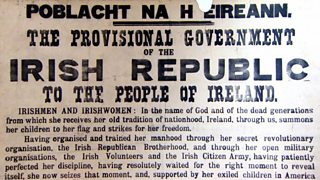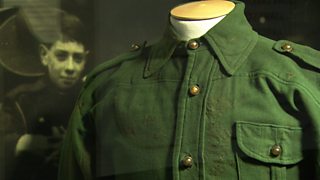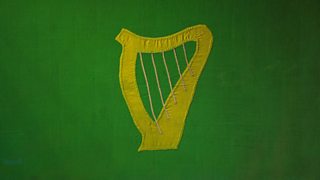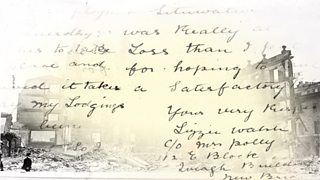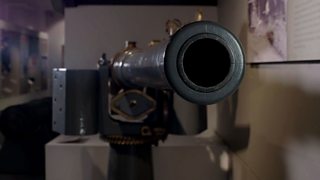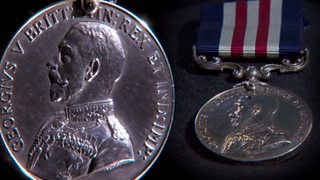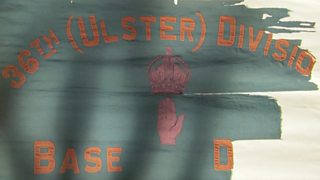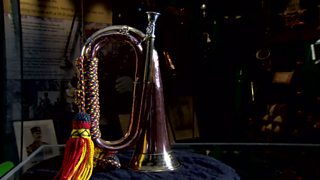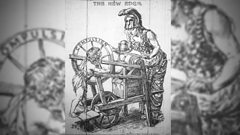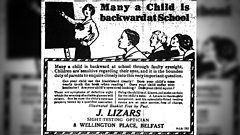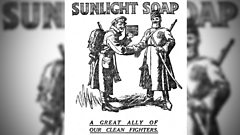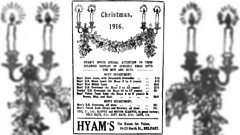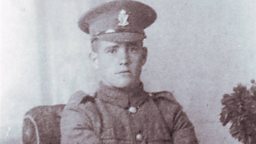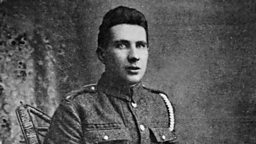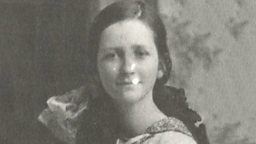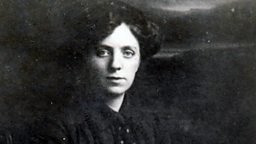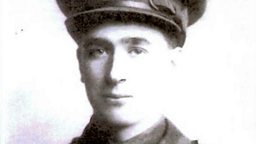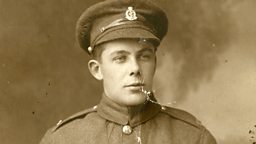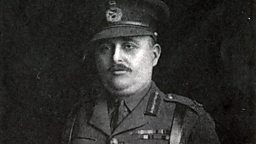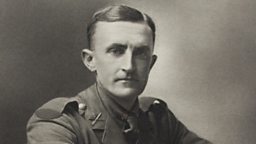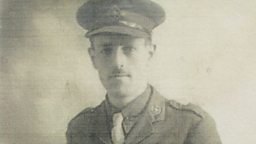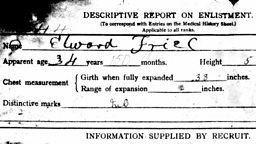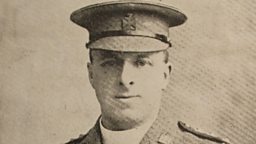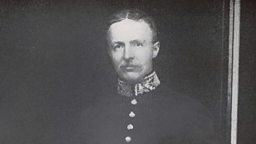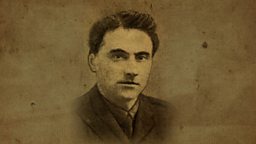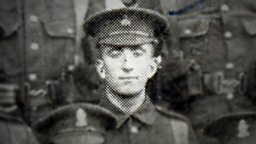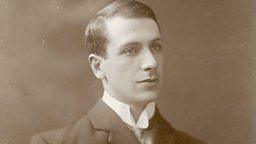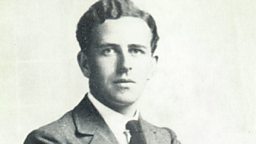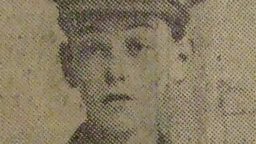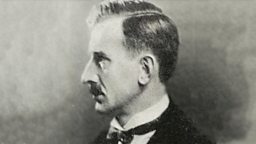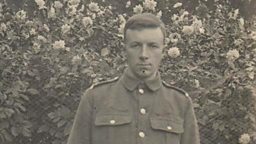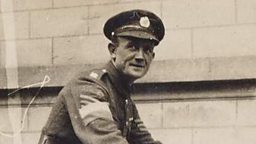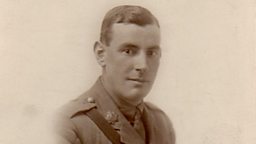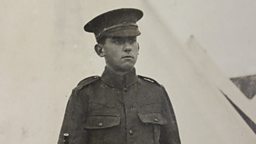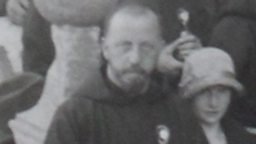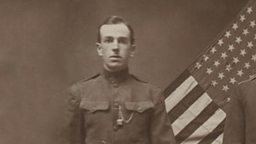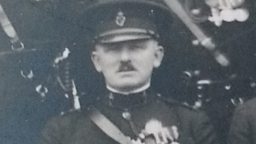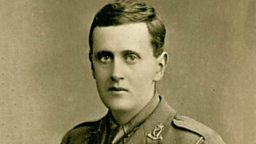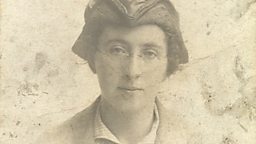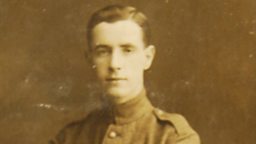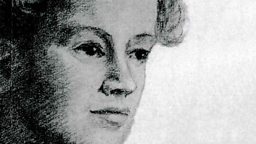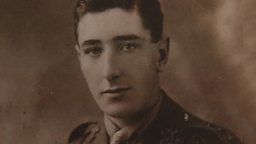Joseph Connolly
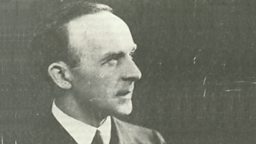
Brings the countermand north
At the time of the Easter Rising, Joseph Connolly is vice-chairman of the Belfast Volunteers organisation. In his memoirs, he recalls that then just four months married, with a recently opened house-furnishing business in Belfast, he got news of the proposed rebellion. He decided to travel to Dublin to fight: "If the Rising was taking place, then there was only one thing to do and that was to join in with the others."
I heard Pearse propounding clearly his doctrine of the need for blood sacrifice
Reaching Dublin, however, Connolly was informed by Eoin MacNeill, Chief of Staff of the Irish Volunteers, that he was cancelling the planned orders for Easter Sunday. He asked Connolly to bring word north to Drogheda, and then return to Belfast. Doing so, Connolly finds himself across the week of the Easter Rising "isolated and detached with no knowledge of what was going on."
Arrested and imprisoned, Joseph Connolly is subsequently released and goes on to become a Fianna Fáil politician, serving in the Seanad [Senate] of the Irish Free State, and being appointed Minister for Posts and Telegraphs, and Minister for Lands and Fisheries.
Background
Joseph Connolly was born in Belfast in 1885. He attended Milford Street national school, and St Malachy's College. He then joined the family bakery business, and spent time as an engineering apprentice, before finding work with a firm of house furnishers. By 1913, he described his life as being comfortable:
"In the year 1913 I was twenty-eight years of age, and a reasonably contented bachelor living comfortably at home with my parents ... we went to dances and parties and theatres regularly, but I had no desire and no intention of changing my way of life. I had a comfortable job which I liked and at which I worked hard and earned a decent income adequate for my needs. I had a comfortable home, my walks and books and friends ..."
Connolly had also made some successful efforts at being a writer:
"... I had started to try and do some serious writing. I had had a three-act play, which I had submitted, produced by the Abbey Theatre, and Yeats had written me favourably about another and made various encouraging suggestions. I had my contacts with the Ulster Literary Theatre and the Arts Club, and I was doing occasional articles for Griffith ..."
Connolly adds, however, that while he did "preserve that other life that was definitely my own", he also found "politics absorbed a good deal of time and energy."
Freedom Clubs
In 1911, Joseph Connolly had been one of those who founded a 'Freedom Club':
"For some years a small group of us had been running the 'Freedom Club'. This was the No.1. Freedom Club of quite a large number that were subsequently formed throughout the Country ... Its immediate purpose was educational from the Sinn Féin and Separatist point of view and aimed particularly at 'roping in' the young people in the Fianna ..."
Members were available, he says, to "co-operate in Gaelic and Irish Ireland activities as well as anti-recruiting propaganda and all separatist movements."
Connolly was never, he says, "at any time a member of the I.R.B.", though, "sometime (I think in 1911 or 1912) I was 'sounded' ..." In response, he says he explained: "... 1. I had personal conscientious objections to becoming a member bound by oath to commit myself to unknown obligations. 2. I believed that my word was my bond ..."
Irish Volunteers
Joseph Connolly says that at one of the Freedom Club meetings:
"... in 1913 when the Ulster Volunteer Movement was at its height, I read a paper entitled 'The Need of the North' which argued the case for starting a division of the Irish Volunteers in Belfast. I may say that at this time the attitude of some of the leaders of the Irish Volunteers at Headquarters was against starting in Belfast and the North ..."
He says, "the fear of doing so was no doubt due to the risk of precipitating local rows and rioting, and the fact that the big majority of the Catholics and Nationalists were staunch supporters of the Irish Party and the local leader, Mr Devlin. Some of us did not agree with this 'go safe' policy ..."
His paper is published, Connolly says, and "it was as a result of this that the meeting was held and at which it was decided to start ... a Committee was formed, Mr. [Denis] McCullough was elected Chairman and I, myself, vice-Chairman ..." Joseph Devlin, he says, "was not in favour of any such move ... [but] the others present were all in favour of going on."
The newly formed Irish Volunteers in Belfast then, Connolly recollects, "got under way at once and arranged for opening meetings and drill ... We had over a hundred at our first signing-on ..." Rapidly, he says, it "became apparent that, despite ... the Parliamentary Party and Mr Devlin, recruitment was going on steadily and we were hard pressed to deal with all the recruits who joined us."
He himself, he says, refused a promotion in military rank, saying that he "refused to be anything but a Private in the military organisation under any circumstances", but also noting he had had "no test to show that I was competent to hold such a rank." He objected to anyone being promoted, he says, "to a military post of responsibility unless as a result of military examination."
Then, Connolly says, John Redmond's Irish Parliamentary Party "finding that their prohibition against joining was being ignored decided on a complete reversal of policy ... the Party supporters were urged to join up and get control ... In Belfast we were swamped out and our figures leapt ahead until there were upwards of five thousand men in the regiment."
Pearse and 'blood sacrifice'
Connolly says that in 1914, he attends a lecture at the Belfast Volunteers, following which the speaker,"“Pádraig Pearse had, with a few of our colleagues, come home with me for supper. We sat late ... The night stands out clear-cut in my memory for it was the first time that I heard Pearse propounding clearly his doctrine of the need for blood sacrifice and the necessity for the re-baptism of the country for the salvation of the national soul. What struck me at the time was the quiet, calm, deliberate way in which he gave us his views."
Outbreak of World War One
Connolly describes hearing of the outbreak of World War One as he is setting out for "a couple of weeks holiday. It was the first Saturday in August 1914 and our destination was Carnlough. The Volunteer situation was working up to the crisis ... We left the train at Larne to join the 'long car' for the coast road and heard the news of the British ultimatum. The war was on ..."
The consequence of this, he says, was "... the days of peace were over for our generation. However, we did not realise this all at once. We were young and full of energy and optimism and we made the most of our holiday. We came back to struggle through all the local conflict of the Volunteer situation and to adjust ourselves to the war that involved us all irrespective of our views or work."
Belfast Volunteers split
On his return, Connolly notes that "at the outbreak of War the acute differences between the politicians and those of us who wished to see the Volunteers maintained for purely Irish activities and who were fundamentally opposed to any service whatever to the British reached a climax. The situation was doubtless the same all over the country but there was, I think, the important difference in Belfast that the political leader was Mr Devlin who was the head of the AOH and the most active force in the United Irish League at the time." Joseph Devlin, Connolly says, also "had unparalleled personal loyalty from his supporters in Belfast and the North generally."
Connolly endeavours himself, he says, with others, "to get a decision against recruitment to the British Army", but this is to no avail:
"... a General meeting of the whole Volunteer Organisation was held in St Mary's Hall on a Sunday afternoon ... Of that meeting it will suffice to say that Mr Devlin took over complete control of the Belfast Regiment and organisation ... We were ejected from the Meeting and later when we took stock of the position, we reckoned that only about 200 remained loyal to the original Volunteers ..."
He himself felt, he records, that "the aftermath was depressing and I felt bitter beyond expression." Nonetheless, "the remnant of loyal adherents continued ... the small group of Volunteers carried on. Their numbers were small but the majority were earnest and keen in their work."
Meanwhile, Connolly observes regarding British Army recruitment, "thousands of young men joined up, and whatever else might be charged against them, the cream of the young business and professional men who were Carsonite and anti-Home Rule in their outlook were soon in their officers' uniforms and many of them never returned from France."
Recalling the loss of one man he knew, the "ablest and best of the family", Connolly adds: "He was typical of so many others that we knew and liked, notwithstanding our differences in religion and political outlook."
Earlier in 1916
In early 1916, Joseph Connolly found himself both a newly-wed, and the owner of a new business.
In January he had married, describing his new wife as "a girl of great courage and good humour ... the one great consoling comfort that transcended all else." He had also "started business on my own account" just months before:
"... in April 1915 I opened the door and the firm of 'J Connolly & Company' was launched. The '& Company' was purely titular. I had no partners. ... I had resolved that, however small my concern would be, it would be my own."
But at the same time, he says he sensed there were "various ominous rumblings." He thought the Volunteers "in Belfast and the North generally ... weak in numbers and organisation." This he attributes to a number of factors, including Joseph Devlin’s views, and his own belief that:
"We were living in an overwhelmingly hostile atmosphere surrounded by jingoistic war-spirit and a population that had gone 'off the rails' with war-time prosperity. Apart from the day and night activities of the shipyards, the foundries and engineering shops were swamped with orders for munitions, the clothing manufacturers with contracts for the army and navy, while the linen mills were hard pressed to supply all the aeroplane canvas that was demanded. It was an orgy of big wages and big spending, of fur coats and jewellery and heavy drinking."
For some weeks before Easter 1916, Connolly says, "there had been many rumours ... including the persistent one that the government intended to make a swoop of all the Volunteer leaders, seize all the arms ... and then enforce conscription on the young men of the country."
Easter Week 1916
Plans for the Rising
Connolly describes how he got news of the Rising: "Early in Holy Week 1916 Colm O'Loughlin visited me at my home where he was an occasional guest. He informed me of the plans for the Rising which had been arranged for Easter Sunday ..."
This news, says Connolly, was "not unexpected, but it was definite and specific." He was determined to participate: "The prospect of breaking up our home and business life cast more than a shadow over us, but there it was and, however things might work out, it had to be faced. If the Rising was taking place, then there was only one thing to do and that was to join in with the others."
The plan for the Belfast group was, Connolly recalls, that it "... was to proceed to Coalisland, County Tyrone." Of this, he says he told colleagues that, "I believed that to send our handful of men, about one hundred to one hundred and fifty was the most we could expect to turn out, to an outside pocket in Tyrone seemed stupid and futile, and, apart from that, I had no confidence whatever in the ability of those who would be leading them."
So, Connolly says, he "arranged with him [O'Loughlin] to travel to Dublin on Holy Saturday, bringing with me such 'material' as I had and join up with his company on the Sunday." This decision he says, was not impulsive, but followed considered thought. Then, believing "that we will all be wiped out", Connolly made his own personal plans:
"I informed Alec (my brother) that I promised to make legal arrangements that he and my wife should take over the business on a fifty-fifty basis if I shouldn't survive and this was agreed."
But, he says, "... my plan was extinguished the next day when Alec informed me that he was not prepared to agree with my plans; that he also was a private in the Volunteers and that if things were going to happen it was his duty to be there. There was no answering that and so it was arranged that we should both go up to Dublin on the Sunday afternoon, contact Colm Ó Lochlainn [O'Loughlin] and fall in with his company."
To Dublin
Joseph Connolly and his brother reached Dublin on Saturday afternoon. He says he was aware of rumours "to the effect that ample supplies of arms and ammunition would be landed ... the ports would be guarded by submarines to prevent the British landing troops."
But these rumours, he says, "were quite indefinite, and naturally so, for one could sense even from published reports that there were two opposing schools of thought amongst the leaders in Dublin ..."
Connolly says he was "always shadowed" by police on arrival in Dublin, and on this occasion, a policeman was there "if not to greet us at least to spot and shadow us." He manages to hear that there is "bad news from Kerry ... an attempt to land arms there had failed ..." The brothers split up for the evening, Joseph retiring early at the home of a friend in preparation for the next day.
The countermand
But that night, after 11pm, Connolly says his presence was requested "without delay" by Eoin MacNeill, Chief of Staff of the Irish Volunteers, who "greeted me, asked me about my wife Róisín, who is his niece, and then asked me what I had come to Dublin for. My reply was short and to the point: 'To do anything I am told'."
MacNeill then speaks to him, he says, of the current situation: "I do not remember precisely what he said but the general trend was that things had gone all wrong, arrangements had been badly handled and had already broken down. He proposed accordingly to call off the 'Mobilisation' that had been arranged for Easter Sunday."
While they are talking, Thomas MacDonagh arrived, Connolly recalls, and is shown the countermanding note by MacNeill: "MacDonagh read it and having done so said to MacNeill: 'Of course you realise that your order may not be obeyed'. MacNeill's reply was equally terse: 'The responsibility for disobedience will fall on those who disobey'. MacDonagh paused for a moment as if in thought and then said: 'Well I must consult my friends about this'. Folding the paper, he then left ... I can recall the sinking feeling that the brief conversation gave me."
Connolly is then asked if he will bring MacNeill’s message north:
"MacNeill then went on to discuss with me the arrangements for calling off the mobilisation and asked me if I was prepared to bring word to some of the Northern units. We discussed this and eventually it was agreed that I would leave on the Sunday morning train for the North along with O'Loughlin. The latter was to go to Coalisland ... my instructions were to go to Drogheda ..."
They are given, he says, "copies of the countermanding order signed by MacNeill with instructions to show the orders to the person concerned and ... destroy the copy. Similar orders were given to most, if not all, of those present ..."
He thought, he says, "that it was the old story repeated. 'Differences at the top!' 'More splits', 'Bad planning' and so on ... Let me be quite frank about the position as I saw it then. I did not see what other course MacNeill could have adopted."
Easter Sunday - To Drogheda
Next day, Connolly says he headed for Drogheda as arranged: "The Sunday papers carried MacNeill's countermanding order cancelling all Volunteer activities that had been arranged for the day. I made discreet inquiries and was soon directed to the address which MacNeill had given me and having explained my mission to the gentleman I showed him the order. I impressed upon him the urgency of getting in touch with the local leaders and delivering the message. He assured me that this would be done."
Journeying in the area, Connolly says he encounters a group of Volunteers who seemed unaware of the countermand order, "apparently all set for manoeuvres", and he conveys the message to them.
His instructions, Connolly says, "from MacNeill were that having conveyed his message I was to proceed home ... to convey to the Authorities that nothing unusual was afoot."
So, he says, "I left Drogheda in the late afternoon and, as instructed, returned home. I was mentally exhausted and confused trying to figure out all that I had experienced during my brief absence." He recalls that since his departure the previous day for Dublin, he "had learned enough of divided and conflicting opinions and divergent policies to make one despair. As I saw it, the movement was heading towards chaos unless by the grace of God the differences and difficulties could be ironed out."
That evening, he hears of what happened at Tyrone from one of those who had travelled there, and says he is told "that those in command had decided to 'dismiss' and order the men to return home." Connolly also hears, he says, that "at the time of their dismissal there was no sign of O'Loughlainn [O'Loughlin] nor had they any word of MacNeill’s order."
He himself, he says, regarding the decision to disband in Tyrone, "always believed that, in the circumstances, it seemed the only sane decision to take. The fundamental mistake was in sending a small group to lose themselves in an isolated position in County Tyrone and in the Belfast military leaders agreeing to such a course of action."
Later, O'Loughlin arrives, and tells him that on his arrival at Coalisland, he found the men "had left early that morning to join the train for Belfast." This, he says, concludes the day: "... that was Easter Sunday 1916, and we were a somewhat perplexed and depressed group when we retired for the night."
Reaction to the Rising
On Easter Monday, Connolly says, "I was turning over one question after another in my mind." He hears "the first rumours of 'trouble having broken out in Dublin' ... for the next day or two there were all sorts of stories and rumours ... At first the papers were reticent and it was later in the week before we began to get any real information."
Belfast he recalls as being isolated: "For ourselves we were cut off from any hope of making contact. To travel or to attempt to travel by train was out of the question. All roads were guarded and patrolled and we were isolated and detached with no knowledge of what was going on save the very brief and uninformative ..."
Connolly recalls the rest of the week of the Easter Rising: "The week was a nightmare, a nightmare not only of frustration but of complete sterility. Then came the news of the burning of Dublin, the shelling of the General Post Office and the final surrender of the Volunteer and Citizen Army forces. One went down to business, but ... to move about restlessly with a sense of futility and hopelessness."
He describes news of the surrender, and reactions to it: "After the surrender the papers carried the news or so much of it as the British authorities and their censors considered good for us. At that particular time condemnation of the 'rebels' was almost unanimous and it was pretty grim to sense the hostility not only from the loyal Unionists of Belfast, but from others who would lay claim to the title of 'Nationalists'."
Subsequently, Connolly gets word of the first executions: "We were not surprised, but infinitely saddened ... I could not help thinking that Tom Clarke would go gaily to his death ... Pearse too had fulfilled his destiny ... To those of us of lesser faith everything seemed doomed. We were beaten and crushed. The rising had been a wretched failure, badly planned and badly organised with conflicting opinions and directions at the top ..."
After the Rising
Arrest
Connolly says that "... on the first Friday morning of May I was arrested at my Warehouse in Upper Arthur Street, brought to the Bridewell in Chichester Street and subsequently to the Crumlin Road Jail ..."
At the jail, he says he "... found a group of my colleagues who had been similarly 'rounded up' that morning. There were, I think twenty-seven of us in all but they included my brother Alec ... We were stripped, finger-printed, checked in the usual way and afterwards brought to our cells."
There, his recollection is of "the loneliness I felt for my dear girl at home. There was too the bitter sense of humiliating defeat and the circumstances surrounding it."
Soon, they are moved again: "On the following (Saturday) morning we were transferred in covered Furniture Removal vans to the G.N.R. Stations and on arrival in Dublin were marched to Richmond Barracks."
En route, in the city centre, "... many lined the footpaths to look us over. Most of them were quiet and sullen, but not a few of them were openly hostile and were not slow to express their views."
Richmond Barracks
While at Richmond Barracks, Connolly recalls that "the courts-martial and the executions continued ... what completely depressed us was the news of the execution of Seán MacDermott and James Connolly ..." While they were, he says, "... the last of the sixteen ... day by day men were being sentenced to long terms of penal servitude ..."
He gets to see his wife: "Two weeks after my arrival at Richmond Barracks my wife managed to get permission for a visit. ...[She] arrived with all sorts of comforts in the way of clothing, books and delicacies. It was wonderful to see her again and to hear all the news of the folk at home. Needless to say her reports were all cheerful, everything was going fine, including the business ..."
"The days dragged on, deportations were taking place every day and gradually our numbers dwindled. ... Seán Milroy, my brother Alec and myself ... were transferred to the room across the landing and all the others were dispatched for internment ...”
Shortly after this move, the remaining men were sent to Knutsford Prison, and after some time there, Connolly found himself again transferred, to Reading Gaol.
Commission
During his time at Reading Gaol, Connolly was brought to London to be seen "before the Sankey Commission. It was the Board of Appeal against internment, but all and sundry were brought before it whether they had appealed or not."
He recalls being questioned: "I was brought into the room in my turn. ... questions were few and my answers brief. I was Joseph Connolly ... Where was I in Easter Week? At home in Belfast. Yes, I had been in Dublin to see friends. I returned home on Easter Sunday. No questions about Drogheda or whom I had seen in Dublin. This surprised me, as I expected to be questioned on both matters and that I would have to decline to answer."
Connolly says he "concluded afterwards that the Commission had abandoned any attempt to get informative replies to any questions and the interview was the barest formality."
Release
Connolly was released in December 1916. The release, he says, was sudden: "We had been in Reading for about four weeks when one day seven of us were called in to the governor's office and told to be ready to leave without delay. We were given travel vouchers to our home towns and we were so rushed and hustled by the warders that we had barely time to gather our few belongings and say goodbye to our colleagues whom we were leaving behind us."
In Belfast, Connolly recalls being met by his wife and some friends: "I was free and I was home. ... There was only the constant sting in the thought not only of those I had left behind in Reading ... There could be little joy or peace of mind while any of them remained behind the bars or the barbed wire. Despite all, however, I was home ..."
However, he finds his business in difficulty: "Business had been bad while I was away. That was only to be expected in the city of Belfast. Sinn Féin was not exactly loved by the Belfast loyalists and indeed it was at that time but a small minority of the so-called nationalists that would have a word to say in its defence."
Nonetheless, he found, he says, "the contrast between the hostility which we met immediately after the Rising and the friendly attitude which we experienced on our return was remarkable. This was of course less discernible in Belfast than in the rest of the country, but even in Belfast many of the supporters of the Parliamentary party and Mr Devlin had been doing some heart-searching, and, while most of them were still hostile to Sinn Féin, there was a subdued note in their approach."
Within the year, he says, his business was "running smoothly ..."
Later life
On the establishment of the First Dáil in 1919, Joseph Connolly was appointed to the Commission of Inquiry into the Resources and Industries of Ireland. In 1921, he sold his business, going to the United States as the Consul-General for the Irish Republic (1921-22).
Joseph Connolly would be elected to the Irish Free State's Seanad Éireann [Senate] in 1928 from the Fianna Fáil panel, and remain a member of the Seanad until its abolition in 1936. From 1932 on, he became a member of the Fianna Fáil cabinet, being Minister for Posts and Telegraphs (1932-33), and then for Lands and Fisheries (1933-36). He served as the Controller of Censorship during WWII (1939-41), and from 1936 he was Chairman of the Commissioners of Public Works, retiring from this position in 1950. He died in January 1961.
These pages are based on personal testimonies and contemporaneous accounts. They reflect how people saw things at that time and are not meant to be a definitive history of the period.
Voices 16 objects
Voices 16 galleries
Credits
Joseph Connolly's recollections are taken from his Witness Statement, and from the Memoirs of Senator Joseph Connolly (1885-1961): A Founder of Modern Ireland, ed. J. Anthony Gaughan, and published by Irish Academic Press.
Extracts and biographical information are published with the kind permission of Joseph Connolly’s family, the , and J. Anthony Gaughan.
Joseph Connolly's image is reproduced with the kind permission of his family.
